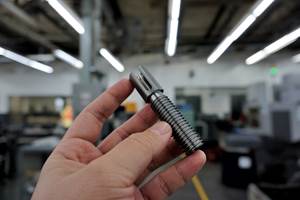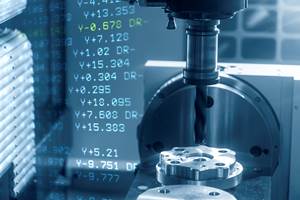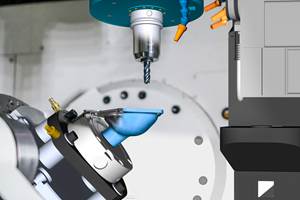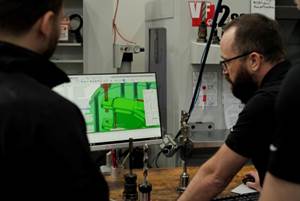PC-Based DNC/CNC Floats The Boat Of This Industrial Marine Manufacturer
Today, J.C. Carter Company is home to four successful divisions, 232 employees and a top-notch DNC network. But like the facilities upgrades, the DNC network took time to evolve into the high quality, easy to use system in place today.
In 1946, Pasadena, California was home not only to the Rose Bowl, but also to a small shop called J.C. Carter Company, which built industrial marine equipment. In 1950, the small shop moved south to Costa Mesa in Orange County into a Quonset hut. This new building was so primitive, that the nearest restroom facilities were down the hill at a bowling alley. Today, the hut has been replaced by a nine-acre office and manufacturing facility with 15 buildings, the newest of which was only recently completed. Today, J.C. Carter Company is home to four successful divisions, 232 employees and a top-notch DNC network. But like the facilities upgrades, the DNC network took time to evolve into the high quality, easy to use system in place today.
In 1985, the company purchased and installed what was then considered a very sophisticated DNC network. The network consisted of one main computer with an 80-megabyte hard drive, parts program management software and 12 terminals which were located on the shop floor. The software operated as most DNC software operates; it sorted the parts programs and uploaded and downloaded them to the terminals on the shop floor when requested.
For awhile everything ran smoothly, but the vendor that sold the equipment to the company had stopped manufacturing the hardware. The system became almost more of a liability than an asset according to Tom Brown, supervisor of manufacturing engineering. "The system had become antiquated and the maintenance cost was $3000 to $5000 per year just to keep the system running. Since the hardware was no longer being made, we had to steal parts from other machines to keep them in working order." Worse yet, the system began to "crash" frequently as well. "We were losing data each time the system crashed," says Mr. Brown. "We had to make punched paper tapes and keep them on hand each time until it happened. It was a nightmare."
Word-of-mouth led the company to contact Greco Systems to request a bid for a PC-based DNC/CNC network. Greco Systems is located in El Cajon, California, only about 100 miles from J.C. Carter's facilities. Their bid was submitted to J.C. Carter's management in the late fall of 1994.
Greco Systems' NC network bid included WinDNC and WinNC Edit software, one CNC minifile and four machine tool interface controllers (MTICs). All components of the network could be easily integrated into the Novell LAN system that J.C. Carter had decided to install and the cost of network was within the company's budget. The company also liked the fact that Greco Systems manufactured both the hardware and the software components of the network system and could easily make repairs or adjustments on both. "If there was a problem with the system, we didn't want to have two companies arguing back and forth, saying `That's a hardware problem,' or `That's a software problem.' We wanted to say to one company `That's your problem -- fix it'," said Mr. Brown. J.C. Carter decided to scrap its current system and they awarded the network contract to Greco Systems in January 1995.
WinDNC software is a Windows-based parts program management software with one distinct advantage over other similar software packages it can communicate to nearly all machine tools controls regardless of the age of the machine. This application is used to store parts programs, download parts programs into the machines and upload edits made on the shop floor into the system. Used in conjunction with WinNC Edit, WinDNC provides operators the ability to copy, edit or delete files and provides management with the opportunity to compare all parts program edits a feature that J.C. Carter company found particularly useful for their shop floor management procedures.
The complete installation of both the hardware and the software was done in about four days. With installation complete, management also updated their ways of shop floor operations. Operators are now able to request that programmers download specific parts programs via e-mail. This information is also passed along to the Pre-Kit department, where proper tooling and material are "kitted" for the specific job. Once these materials are delivered to the operators, the job is set-up by the operators. At this point, the operators move to one of the shop floor PCs and load the parts program into the machine tool control. If the shop floor PC is not available, the operator can utilize WinDNC's remote call down capabilities which allow the operator to download the part program from the machine tool control.
After the job has been run, Mr. Brown and the other management staff utilize the WinNC editor to compare all edits made on the shop floor to the original part program. At this point, evaluations are made as to whether or not to keep the original program or the edited version.
According to Mr. Brown, there are other benefits in addition to the ease of operation that WinDNC has brought to J.C. Carter including top-notch dependability and the fact that the new network makes keeping track of parts programs much easier. Although Mr. Brown has not added up the exact dollar figure on his cost savings with the network, he has come to the conclusion that the new system has paid for itself within six months to one year due to the decrease in labor costs plus the elimination of downtime and the $3000 to $5000 per year required to maintain the old system.
Tom Brown, like many other shop floor managers, has learned that achieving company-wide success depends upon reliable equipment and systems for continued growth and corporate efficiency. As J.C. Carter Company's growth from a small Quonset hut with no plumbing to a large modern office complex indicates, a good NC network and dedicated staff leads to shop floor effective-ness and company prosperity.
Related Content
When Handing Down the Family Machine Shop is as Complex as a Swiss-Turned Part
The transition into Swiss-type machining at Deking Screw Products required more than just a shift in production operations. It required a new mindset and a new way of running the family-owned business. Hardest of all, it required that one generation let go, and allow a new one to step in.
Read MoreTips for Designing CNC Programs That Help Operators
The way a G-code program is formatted directly affects the productivity of the CNC people who use them. Design CNC programs that make CNC setup people and operators’ jobs easier.
Read MoreImprove Machining Efficiency Through Digital Twin Simulation
Full simulation of a machining cycle using digital twins can not only identify crashes before they happen, but provide insights that enable the user to reduce cycle times.
Read MoreAutomated CAM Programming – Is Your Software Really Delivering?
A look at the latest automation tools in Autodesk Fusion 360 software and how forward-thinking machine shops and manufacturing departments are using them to slash delivery times and win more business.
Read MoreRead Next
Increasing Productivity with Digitalization and AI
Job shops are implementing automation and digitalization into workflows to eliminate set up time and increase repeatability in production.
Read MoreThe Future of High Feed Milling in Modern Manufacturing
Achieve higher metal removal rates and enhanced predictability with ISCAR’s advanced high-feed milling tools — optimized for today’s competitive global market.
Read MoreInside Machineosaurus: Unique Job Shop with Dinosaur-Named CNC Machines, Four-Day Workweek & High-Precision Machining
Take a tour of Machineosaurus, a Massachusetts machine shop where every CNC machine is named after a dinosaur!
Read More
















.jpg;maxWidth=300;quality=90)








